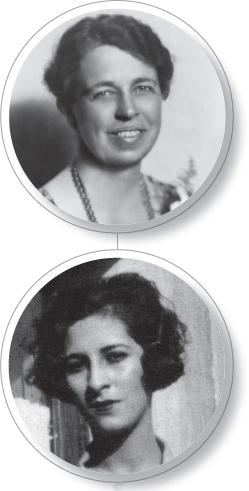Exploring American Histories: Printed Page 687
Exploring American Histories, Value Edition: Printed Page 564
American Histories: Eleanor Roosevelt and Luisa Moreno
AMERICAN HISTORIES

Anna Eleanor Roosevelt came from an old Dutch American family of wealthy merchants and bankers. In 1901, at the age of fifteen, she saw her uncle Theodore succeed William McKinley as president. Like other girls of her generation, Eleanor was expected to marry and become a “charming wife.” Eleanor appeared well on her way toward doing so when she struck up a relationship with her distant cousin Franklin Delano Roosevelt, whom she married in 1905. Over a ten-year period, Eleanor gave birth to six children, further reinforcing her status as a traditional woman of her class.
Two events, however, set her life on a very different path than the one she had embarked on when she married Franklin. First, thirteen years into her marriage Eleanor discovered that her husband was having an affair with her social secretary, Lucy Mercer. She did not divorce him but made it clear that she would stay with him primarily as a mother to their children and a political partner. Second, in 1921 the thirty-nine-year-old Franklin contracted polio. Although he recovered, Franklin would never walk again or stand without the aid of braces. From this point on, Eleanor threw herself into public life, taking a more active role in her husband’s political career and writing about personal and political issues for a range of publications.
After her husband won the presidency in 1932, Eleanor did not function as a typical First Lady. She played a very public role promoting her husband’s agenda, and she also took advantage of her own extensive network of friends and acquaintances in labor unions, civil rights organizations, and women’s groups to advance a variety of causes. In many ways more liberal than her husband, Eleanor was a fierce advocate for the rights of women, minorities, workers, and the poor. Behind the scenes, she pushed her husband to move further to the political left.
Eleanor Roosevelt’s proximity to power provided her with a unique position from which to confront the problems of her day. She was not, however, alone in her desire to work for social and economic justice. Luisa Moreno provides a striking example of an activist whose American story bears little resemblance to that of Eleanor Roosevelt. A native of Guatemala, Moreno moved to Mexico and then New York City, where she led a difficult life. In the midst of the Great Depression, Moreno worked as a seamstress in a sweatshop to support her young child and unemployed husband. Like tens of thousands of people disillusioned with capitalism, in 1930 she joined the Communist Party but quit several years later.
In 1935 Moreno went to Florida to organize cigar workers for the American Federation of Labor (AFL). Despite numerous successes, she grew tired of the AFL’s refusal to recruit unskilled workers and jumped to the Congress of Industrial Organizations (CIO), which formed in 1935. That same year, she began working for the United Cannery, Agricultural, Packing, and Allied Workers of America (UCAPAWA), an affiliate of the CIO. Encouraged by the federal government’s establishment of the National Labor Relations Board in 1935 to safeguard union organizing, by 1943 Moreno and her colleagues in the UCAPAWA had won more than thirty elections recognizing their union among cannery workers.
Moreno also promoted the advancement of Latinos throughout the United States. In 1939 she helped create El Congreso de Pueblos de Habla Española (The Congress of Spanish-Speaking People). Besides championing equal access to jobs, education, housing, and health care, the organization pressed to end the segregation of Latinos in schools and public accommodations. Moreno was not nearly as well known as Eleanor Roosevelt, but she worked just as hard to fight poverty, exploitation, and racial bigotry on behalf of people whom President Franklin Roosevelt called “the forgotten Americans.” •
WHILE THE AMERICAN HISTORIES of Eleanor Roosevelt and Luisa Moreno were very different, both of their lives were shaped in fundamental ways by the same global catastrophe, the Great Depression. The economic crisis that erupted in 1929 made a bad situation worse for the majority of Americans. Even before the Great Depression, most Americans lived at or near the poverty level, surviving month to month. By 1933, millions of Americans had lost even this tenuous hold on economic security, as unemployment reached a record 25 percent, a figure that did not include those who had stopped looking for work. Succeeding President Herbert Hoover, Franklin Roosevelt initiated policies that departed profoundly from the reliance on private charity and voluntary efforts that had characterized Republican responses to economic problems throughout the 1920s. Proclaiming the establishment of a New Deal for America, Roosevelt expanded the power of the federal government in ways that previously had taken place only during wartime, and he forged a new political order in which the Democratic Party ruled for generations to come.